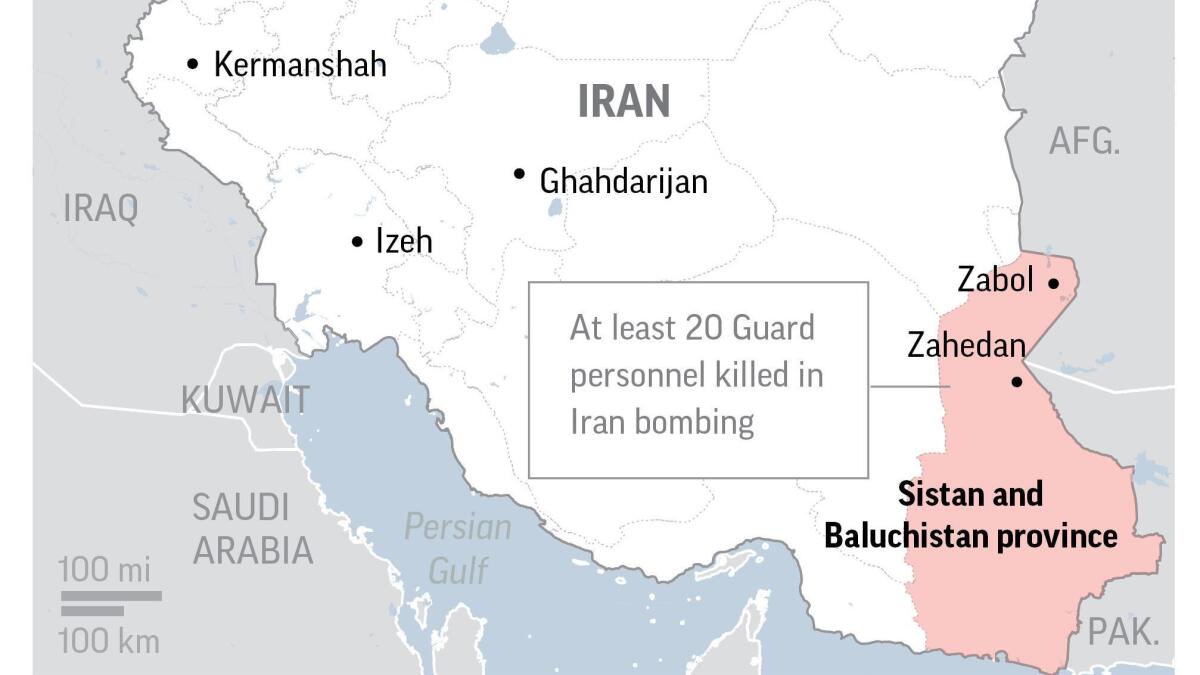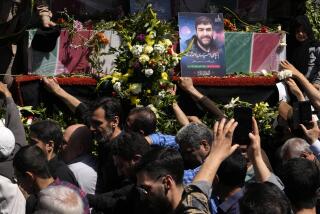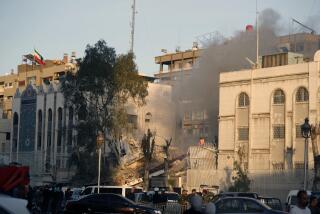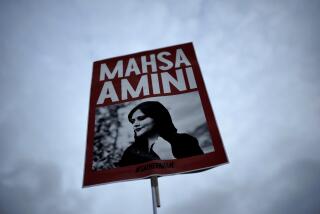Iran suicide bombing kills 27 Revolutionary Guard members

A suicide bombing killed 27 of Iran’s elite Islamic Revolutionary Guard members and injured 13 others shortly after sunset Wednesday in the country’s southeast, according to state media.
The Sunni Muslim extremist group Jaish al-Adl claimed responsibility for the attack on a bus carrying guard members who had just finished patrolling in Sistan and Baluchistan province near the border with Pakistan.
Authorities believe the attacker drove up next to the bus before detonating a car bomb, according to the semiofficial Fars news agency.
Jaish al-Adl came to prominence in recent years claiming to fight oppression against the Sunni minority in the southeastern province.
An overwhelming majority of Iran’s population is Shiite Muslim, but about 9% of the nation is Sunni. Many in the minority sect live in the impoverished outlying areas of Iran and say they face discrimination, poverty and a lack of opportunity.
“The group has become pretty famous in Iran,” Ariane Tabatabai, an associate political scientist at Rand Corp., said of Jaish al-Adl. “What makes Wednesday’s attack unique is that it’s happening in the middle of the anniversary of the revolution, which is a time when Iran wants to showcase its military power.”
The attack came two days after thousands of Iranians commemorated the 40th anniversary of the Islamic Revolution, which ousted a secular pro-Western monarchy and replaced it with the Islamic Republic.
It also came on the first day of a U.S.-led Mideast conference in Warsaw. Outside the conference, hundreds of demonstrators called for a change of government in Iran. The protest was organized by the National Council of Resistance of Iran. The council is linked to the Mujahedin Khalq, an Iranian exile group that has long sought to topple the government in Tehran and enjoys support among some members of the Trump administration.
Iranian Foreign Minister Mohammad Javad Zarif sought to link the attack with the conference in a tweet: “Is it no coincidence that Iran is hit by terror on the very day that #WarsawCircus begins? Especially when cohorts of same terrorists cheer it from Warsaw streets & support it with twitter bots?”
Bahram Qasemi, a spokesman for the Foreign Ministry, condemned the suicide bombing and said officials and Iran’s military would “take revenge on the murderous terrorists.”
Jaish al-Adl, whose name means “Army of Justice,” is an offshoot of the still-active militant Jundallah separatist group from Sistan and Baluchistan, Tabatabai said.
Jaish al-Adl is just one of several extremist groups in the province, Tabatabai said, with members of Iran’s armed forces patrolling there facing numerous terrorist attacks in recent years. The area is one of the most underdeveloped parts of Iran, she said.
“There are few jobs and not many opportunities, so it creates an environment where terrorist groups can recruit people easily,” Tabatabai said.
Jaish al-Adl has targeted members of Iran’s armed forces for kidnappings or deadly attacks. The group has also demanded the government release its jailed members.
In 2013, authorities hanged 16 people in retaliation for the killing of 14 border guards who were ambushed near the border with Pakistan.
It’s unclear whether the prisoners were part of Jaish al-Adl. Fars said they were linked to groups hostile to Iran’s political system.
In 2014, Jaish al-Adl kidnapped five members of the Revolutionary Guard in the same border region, according to state media. Four of the guards were released in Pakistan two months later, but the fifth had been executed, state media said. The group kidnapped 12 Iranian border guards in October, according to state media. Five were later freed, Fars reported.
The Revolutionary Guard was formed by Shiite cleric Ayatollah Ruhollah Khomeini shortly after the 1979 revolution and is distinct from the regular military. In its early days, the guard was made up of destitute young men from urban areas who were used to clamp down on critics of the revolution.
The Revolutionary Guard, numbering about 125,000 members, now plays a major political and economic role in Iran and is a potent symbol of the Shiite majority.
Special correspondent Mostaghim reported from Tehran and Times staff writer Etehad from Los Angeles.
More to Read
Start your day right
Sign up for Essential California for news, features and recommendations from the L.A. Times and beyond in your inbox six days a week.
You may occasionally receive promotional content from the Los Angeles Times.







